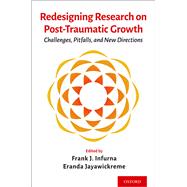Redesigning Research on Post-Traumatic Growth Challenges, Pitfalls, and New Directions
, by Infurna, Frank J.; Jayawickreme, Eranda- ISBN: 9780197507407 | 0197507409
- Cover: Hardcover
- Copyright: 8/6/2021
The literature on post-traumatic growth (PTG) has been instrumental in highlighting the human capacity to overcome adversity, illuminating the different pathways people may follow when confronted with adversity. Although the theme of strength from adversity is central to many disciplines and certain cultural narratives, these claims lack robust empirical evidence. This literature gap can be traced to a reliance on retrospective assessments for methodology and difficulty in determining which outcomes are most appropriate for studying PTG.
Redesigning Research on Post-Traumatic Growth offers new directions for PTG research. The book illustrates the benefits of research designs that incorporate multiple methods of assessment and highlights the value of integrating various disciplines, such as philosophy and multiple areas of psychology (e.g., clinical, developmental, health, and personality) for more holistic understanding of the human capacity to overcome adversity. The book is divided into four sections: current challenges in examining PTG, methodological advancements, research in specific populations, and opportunities for further research. Introductory chapters identify the limits of traditional PTG assessments and find solutions in prospective longitudinal studies. From here, this methodology is put into practice with unique case examples from studies with Syrian refugees, older adults, and couples coping with a cancer diagnosis. The book concludes with calls for further research on event characteristics of adversity, as well as narrative identity, wisdom, and open-mindedness as key growth outcomes. Redesigning Research on Post-Traumatic Growth will serve as the starting point for the next generation of research on PTG
Redesigning Research on Post-Traumatic Growth offers new directions for PTG research. The book illustrates the benefits of research designs that incorporate multiple methods of assessment and highlights the value of integrating various disciplines, such as philosophy and multiple areas of psychology (e.g., clinical, developmental, health, and personality) for more holistic understanding of the human capacity to overcome adversity. The book is divided into four sections: current challenges in examining PTG, methodological advancements, research in specific populations, and opportunities for further research. Introductory chapters identify the limits of traditional PTG assessments and find solutions in prospective longitudinal studies. From here, this methodology is put into practice with unique case examples from studies with Syrian refugees, older adults, and couples coping with a cancer diagnosis. The book concludes with calls for further research on event characteristics of adversity, as well as narrative identity, wisdom, and open-mindedness as key growth outcomes. Redesigning Research on Post-Traumatic Growth will serve as the starting point for the next generation of research on PTG






